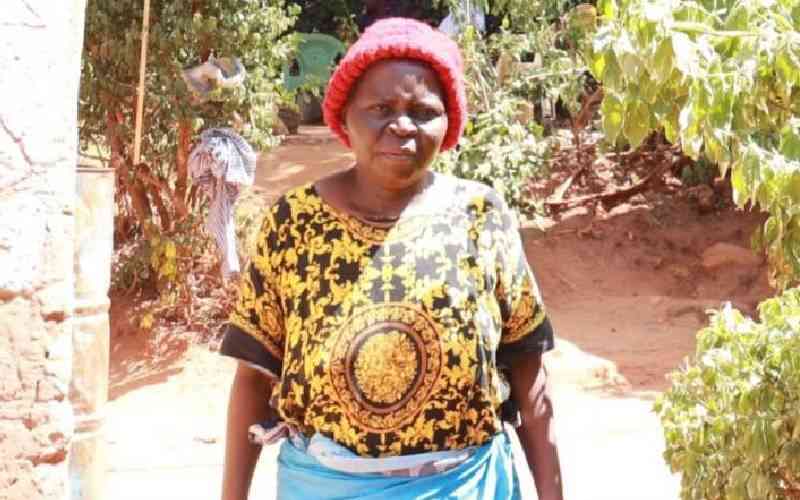
When Lilian Musau first visited the hospital in 2017, she had been experiencing some excruciating pelvic pain and bleeding.
After a doctor's consultation and general tests, she was sent for an additional test (pap smear) where tissue was removed from her cervix for a lab test.
When the results came out, she was diagnosed with Stage One cancer.
Since the cancer was discovered at an early stage, through the physician's guidance, she opted for a hysterectomy where both her cervix and uterus were removed to prevent a further spread of the disease. All this time, the mother of four who is a resident of Mumbuni Sub location, Machakos County, says she was not familiar with the treatment and did not quite understand the process.
Following her diagnosis and treatment, Ms Musau was full of joy and hopeful that the dreaded dragon had finally left her body. In her innocent conviction that she was healed, albeit ignorant, she did not seek medical follow-up or attention for the next four years.
"I was no longer in pain, so I did not bother to do any clinic follow-up after treatment, and no one followed on me to advise me to attend clinics," she says.
Then the shocker set in. In 2021, she experienced the same abdominal pains she had experienced when she sought medical attention in 2017. She could not understand what was happening and as the pain intensified, she was forced to go to the hospital.
"When the pains persisted, I was so traumatised and lost hope," says Musau, adding that at this point, her husband Paul Musau, alarmed by her condition, suggested that they visit the Machakos Level 5 hospital for an opinion.
- Kenya hosts breast cancer training as awareness month starts
- I lost my hair and breast, but never my hope: Roseline's cancer victory
- AAR Hospital cuts cancer screening costs
- How breast cancer survivors are turning scars into courage
Keep Reading
At the Machakos Level 5, facility tests were carried out, and the doctor gave her the devastating diagnosis of Stage Four cervical cancer, a surprise to both the patient and the medics.
The medics attributed the diagnosis to the probability that either the original treatment did not get rid of all the cancer cells, which then spread to other parts of the body.
"When this happens, it means that the treatment applied did not kill all the cancer cells. Those that were not destroyed grew into a tumor. It could also mean that at the time of the treatment, some cancer cells had already broken away from primary cancer but were too small to see, amongst other reasons," explains Dr Andrew Kirimi, head of the oncology unit at the Machakos Leve 5 Cancer Centre.
Ms Musau is, however, convinced that had she followed up with her clinics after the treatment for the next five years (a health requirement for cancer survivors), or had someone at the cancer centre "pinned" her name for follow-up, the recurrence of cancer could have been arrested and treatment started immediately.
Ms Musau's case is an echo of lamentations from cancer victims, and survivors, a large number of who are not aware of the need for follow-up with review clinics after treatment and others who do not do so due to the high cost of cancer treatment, something that is becoming unbearable each day for vulnerable cancer patients, most of who are on the verge of losing hope.
"Sometimes I am in great despair but other times a silent voice from deep inside of me reminds me that I have to keep the hope and fight even though the burden of treatment is really straining my husband," she says.
Her husband says that he has spent over Sh500,000 in treatment, with the monthly treatment cost standing at Sh6,000, an amount he reiterates that he spends only on the purchase of medicine, and not the treatment.
He explains that even though NHIF has come in handy to pay part of the bills, the scheme does not pay for tests like MRI, which cost Sh18,000 each, and does not cover repeated tests as the cover is for only one MRI.
The security guard of a school narrates that his wife's condition has brought a lot of stigma and caused the family to lose attachment with relatives and friends who have abandoned the family in their time of great need.
He says he is the sole breadwinner of the family, but at present, he does not receive his salary as it goes to loan repayments.
From the recent report by the National Cancer Institute of Kenya, there are many others who may be in Ms Musau's shoes.
According to Machakos County Health CEC Daniel Yumbya, the cancer crisis continues to hit the county hard as the number of cases recorded is rising at an alarming rate with patients from poor backgrounds unable to meet treatment costs.
He, however, says the issue is under intense scrutiny by the County's Ministry of Health with a view to providing a lasting solution to the cancer crises and prevent such cases similar to Ms Musau's from happening.
 The Standard Group Plc is a multi-media organization with investments in media
platforms spanning newspaper print
operations, television, radio broadcasting, digital and online services. The
Standard Group is recognized as a
leading multi-media house in Kenya with a key influence in matters of national
and international interest.
The Standard Group Plc is a multi-media organization with investments in media
platforms spanning newspaper print
operations, television, radio broadcasting, digital and online services. The
Standard Group is recognized as a
leading multi-media house in Kenya with a key influence in matters of national
and international interest.











